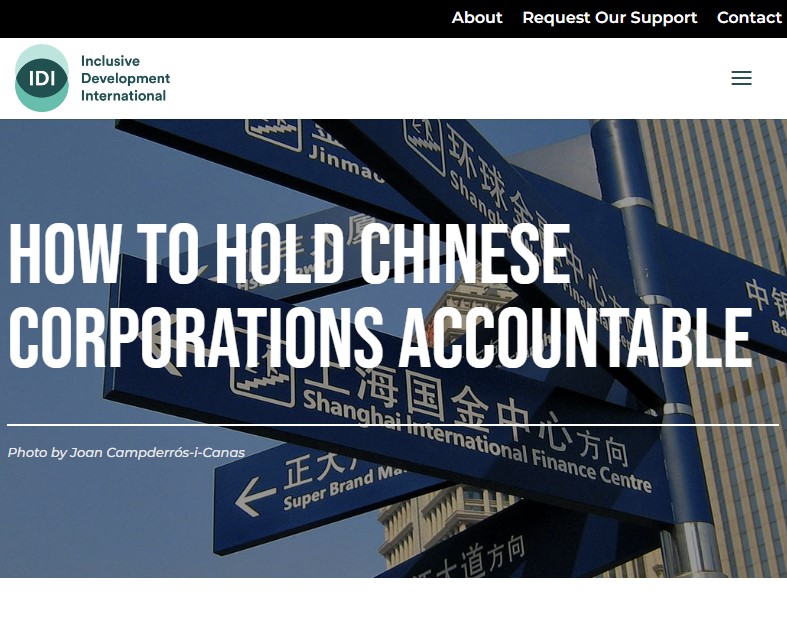Inclusive Development International today published our newest resource for corporate accountability advocates, How to Hold Chinese Corporations Accountable. Part of our larger Following the Money to Justice toolkit, the new resource provides in-depth guidance for researching and holding Chinese corporations accountable for the impacts of their overseas investment projects.
The guide is tailored for advocates working to support communities to defend their rights in the face of harmful and high-risk projects involving Chinese actors. It aims to help them understand how Chinese investors, developers and financiers operate, the standards that apply to their overseas operations and how to use these standards in advocacy to ensure that the rights of affected communities are respected and protected. The new resource builds on Inclusive Development International’s previously-published guides to engaging Chinese stakeholders, adding critical information and detail about relevant policies that have been issued in recent years, and examining overall trends in how Chinese government agencies and industry groups are approaching regulation of overseas projects.
Together with the other resources in our Following the Money to Justice toolkit, the guide will help readers conduct their own investment chain analyses and identify the key Chinese companies, banks, regulators and other actors that have a stake in the project they are focusing on. This information can then be used by civil society groups to identify key pressure points that may create space for engagement or advocacy, and determine which specific Chinese policies and guidelines they can refer to in their documentation and communications.
The new resource includes:
- A background on Chinese overseas investment and finance over the past two decades, from the “Going Out” strategy to the Belt and Road Initiative and China’s aid program.
- An overview of the key actors involved in Chinese overseas projects, including state-owned and private enterprises, financiers and investors, as well as regulators and industry associations.
- An overview of Chinese policies and guidelines that apply to overseas projects, with a focus on provisions concerning social and environmental risk, and an analysis of current trends in China’s governance of overseas projects.
- A deeper examination of particular sectors of Chinese investment and the standards that apply specifically to mining, agriculture and forestry, energy, finance and contracting.
- A set of practical resources and quick reference guides, including tips for finding information on Chinese projects and stakeholders, tips for effectively engaging Chinese stakeholders, and a compilation of standards, policies and guidelines that apply to Chinese overseas investment.
Given the current lack of enforcement mechanisms and limited transparency in monitoring by Chinese regulators, holding many Chinese actors accountable for the impact of their overseas investments remains challenging. However, the development and adoption of a range of social and environmental protection standards in recent years indicates that there is a level of commitment within the Chinese government and industry associations to improve the quality of overseas projects and the image of Chinese investors. This new resource is intended to maximize the impact that community advocates can have by developing a clearer understanding of the various actors that make overseas projects possible, the policies they are bound by and the standards they are expected to uphold, and how those policies and standards can be used strategically in advocacy with Chinese stakeholders.


